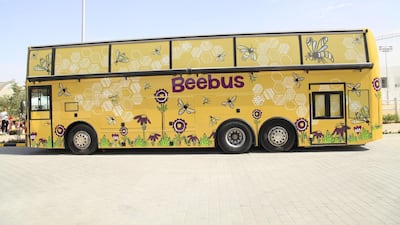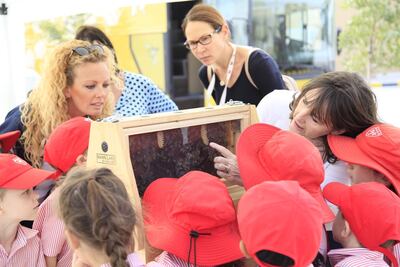Jocelyn McBride keeps as busy as the bees she has pledged to protect. A founder of the UAE Beekeepers Association, the Irish woman and long-time UAE resident is currently running Plan Bee aboard the Bee Bus, to drive a message of sustainability across the country. The project takes the shape of a roving classroom to spread the word about the essential role these insects perform in the food chain, and why bees and other pollinators urgently need our help.
Working with "fantastic volunteers" and with running costs supported by sponsorship, McBride has already conducted more than 40 sessions for schools and other entities, including the Sheikh Mohammed Centre for Cultural Understanding and the Emirates Airline Festival of Literature, where she talked about traditional beekeeping practices in the Middle East, and discussed some of the references made to honey and bees in the Quran.
While most school curriculums cover sustainability in local communities in one form or another, the Bee Bus provides a platform to further explain why the honey bee is so important to the environment, ecology and our survival; 85 per cent of our food crops depend on the actions of pollinators, so it’s easy to imagine the impact that a depleted bee population would have on global food production.
“The Bee Bus is me and I am the Bee Bus,” says McBride, who has prevailed on as many business contacts from her former marketing career (she has worked in the Emirates since the early 1990s) and friends as she can to keep her Bee Bus on the road. “This is now my job.”
As an interesting aside, before its conversion into a fully equipped solar-powered mobile classroom, the bus was the touring vehicle of Australian rock band INXS (the fit-out team found a discarded guitar plectrum during the refurbishment works).
Plan Bee sessions include candle- making, storytelling, artwork and games, as well as opportunities to see actual bees and sections of a honeycomb, all activities that are hands-on and designed to be perspective-changing, while being fun, accessible and engaging.
McBride says when you are talking to children about making an active change, it can be something as simple as planting flowers on your balcony. Her advice: blue and violet flowers work well, but these shouldn’t be treated with insecticide or neonicotinoids. She also offers natural solutions to keep insects off your crops, such as planting marigolds and spraying neem oil, and explains why it’s important to avoid chemicals.
“Children are so enthusiastic; they are keen to learn and are open-minded,” says McBride. “We want to engender this so that these kids become Earth guardians. They are our future scientists, engineers, entomologists and mums and dads; they are our future cooks, gardeners, teachers, professors and lawyers.
“If I can instil in them a spark, which says I know I am going to do this, but I can find a way to do this better by incorporating this thinking when I’m creating my roads or designing my buildings, or whatever … If I can get them to do something in a kinder way, working with nature for a better outcome for us all, then I will have done a good job.”
McBride’s interest in bees and beekeeping dates back to her childhood in Ireland. Her grandfather was a gardener on a big estate, and his energy and love of nature inspired her. It took her a while to break into the honey scene in the UAE, which is still predominantly male and non-English-speaking, but she eventually found a way in through Mohammed Al Najeh, founder of Al Najeh Honey and a key player in developing the commercial beekeeping industry in the UAE. Al Najeh, says McBride, “has forgotten more about bees than I’ve even learnt, and has taught me a lot”.
Ultimately, McBride wants to expand the reach of her Plan Bee project beyond schoolchildren to the wider community. Her long-term objective is also to work with those accommodated at labour camps and teach beekeeping skills to people who can potentially take this know-how to their home countries. “Beekeeping is a great microfinance business. It doesn’t take a lot to get started, but once you do you can change the fortunes of a family or a village.”
To learn more about the Bee Bus, or to make a booking for your school or community, visit http://www.beebus.me


